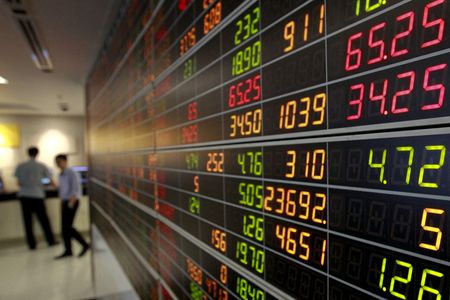By Tom Westbrook and Gaurav Dogra
SINGAPORE/BENGALURU (Reuters) – A shooting tragedy in a Bangkok mall adds to a double-whammy of rising rates and government spending worries that has hammered Thai assets and soured bets on the recovery of Asia’s tourism giant.
Thai tourism stocks slid 1.6% on Wednesday, dragging the benchmark index to its lowest since January 2021, while a stronger dollar sent the baht to an 11-month low.
Foreign selling pressure has been building for weeks, with some $1.65 billion leaving Thai stock and bond markets since the start of September and coming to a head with a surprise rate hike and fiscal spending promises in recent days.
Ten-year Thai government bond yields are now up 75 basis points in little more than three weeks, according to LSEG data, a move even larger than that in U.S. Treasuries.
“There is constant selling in the Thai bond market with very thin liquidity. Bid/offer spreads are wide and it’s difficult to get anything done,” said Toreck Horchani, head of prime brokerage dealing at Maybank Securities in Singapore.
“The market was expecting no hike,” he said.
The Bank of Thailand unexpectedly raised rates last week and said it expected growth and inflation to pick up, leaving the door open to further hikes in future.
Stocks have slid heavily since and are down more than 8% from the end of August, larger than the 5% fall in MSCI’s Emerging Markets Asia index over the same period. September equity outflows exceed those from peer markets in the region such as the Philippines, Vietnam or Indonesia.
Thailand vowed to restore confidence in tourism in the wake of the shooting, in which two foreigners died, though stocks such as Central Plaza Hotel and Airports of Thailand were sold, sending the latter to a seven-month low.
EXPOSED
In ordinary circumstances lifting rates might have been expected to rally the currency, but as already higher U.S. rates have climbed further – amid a rout in global bonds – the baht has lost more than 2% on the dollar in a week.
“This … is primarily attributed to aggressive offshore buying (of dollars),” said Chintana Kittiviboolmas, Thailand head of global markets for UOB, with new concerns around the government’s financing strategy adding to the pressure.
Prime Minister Srettha Thavisin, who emerged as leader from a monthslong period of dealmaking, has promised to inject $15 billion into the economy next year.
In addition to fuel and farming subsidies, the plans seem at odds with the central bank’s efforts to contain inflation and investors are nervous about additional supply in a falling bond market, at a time when global markets are jumpy and fragile.
“In this backdrop there needs to be much greater (not less) monetary and fiscal coordination,” said Aninda Mitra, head of Asia macro and investment strategy at BNY Mellon Investment Management. “The market senses this policy disconnect, and the sell off in the baht seems to be the casualty.”
To be sure, the growth outlook and hope for tourism’s recovery remains supportive.
But even medium-term baht bulls, such as Siddharth Mathur, head of macro strategy and Asia-Pacific emerging markets’ research at BNP Paribas in Singapore, see risks ahead.
“The seasonal improvement in tourism is not due until November, despite high hopes for a surge of Chinese tourists during the Golden Week holiday,” Mathur said.
“Energy import costs are rising in the interim, and the government’s fiscal spending plans will likely trim the current-account improvement we expect,” he said. “That in turn leaves the Thai baht exposed to broad U.S. dollar momentum.”
(Reporting by Tom Westbrook. Additional reporting by Chayut Setboonsarng in Bangkok and Ankur Banerjee in Singapore.; Editing by Shri Navaratnam)



